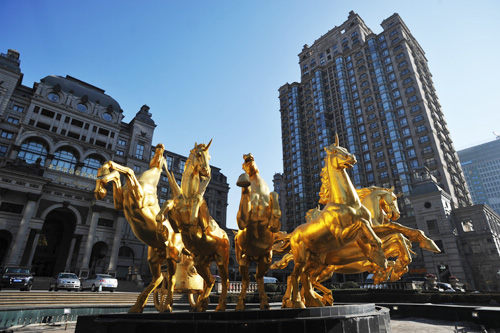|
 |
|
DON'T RUN SO FAST: An apartment community in Beijing. China continues its regulation of the real estate market to curb fast-growing housing prices (CFP) |
Several government departments released a joint circular to control borrowing by local governments, which is the first policy involving the real estate market in the new year.
The Ministry of Finance, the National Development and Reform Commission, the People's Bank of China and the China Banking Regulatory Commission jointly released the circular on January 2, which states that local governments are prohibited from obtaining loans using land reserves as collateral, or using such loans for urban construction or for purposes other than land reserve businesses.
Behind the policy is a struggle among various interests and even some compromise since the strictly regulated real estate market was showing some signs of an upswing at the end of 2012.
According to figures from the Beijing Municipal Commission of Housing and Urban-Rural Development, 260,000 flats (excluding government-subsidized ones) were sold in 2012, surging 67 percent compared to 2011.
Figures from the Shanghai Urban Construction and Communications Commission showed that in December 2012, 1.1 million square meters of commercial apartments were sold, the highest number in 23 months.
As transaction volume expands, property and land prices were also growing. Property developers are increasingly enthusiastic about bidding for land. For example, in land auctions held in Beijing in December 2012, land prices hit a new record high. Many foreign investors that once retreated from China begin to return. Stock prices of listed Chinese real estate developers are going up.
Is this a temporary rise, or does it indicate a rebound of China's real estate market in 2013? Will the Central Government create stricter policies to curb price hikes in the real estate market?
Leaders at the Central Economic Work Conference held in mid December 2012 decided to firmly continue macro-control of the real estate market, setting the tone for 2013.
Zhang Dawei, Director of Market Research at Beijing Centaline Property Co. Ltd., said the Central Government further enhancing regulations of the real estate market indicates that the industry, after two years of adjustment, is still far from the government's target.
Housing prices are still much higher than what the public can afford, and market speculation has not been thoroughly uprooted, said Zhang. Policy in 2013 will focus on making prices more reasonable.
Yi Xianrong, a researcher with the Institute of Finance and Banking at the Chinese Academy of Social Sciences (CASS), said in 2013 the biggest difficulty in macro-control of the real estate market may be urbanization. The Central Economic Work Conference concluded that urbanization has the biggest potential to expand domestic demand and the country will actively and steadily push it forward as the Central Government's focus in 2013.
However, while Yi believes urbanization will stimulate investment, it doesn't necessarily mean real estate alone can advance urbanization. It will be an enormous test for the Central Government to control the real estate market while promoting urbanization.
When urbanization becomes the growth point for the Chinese economy, enhancing regulations of the real estate market and improving housing for the low-income groups should be prioritized, thus avoiding a rush investment in real estate and preventing an overheated market from adversely affecting economic development. "Amid the process of urbanization, macro-control of the real estate market should continue to be strict," Yi said.
The Central Government began limiting home purchase in 2010 and continued to tight regulations in 2012.
According to the Green Book of the Housing Market released by the CASS on December 13, 2012, the government only curbed rapidly growing housing prices in 2012, but did not realize the optimal goal of making prices more reasonable. "The tendency that various indicators in the housing market have risen recently merits vigilance," says the green book.
| 